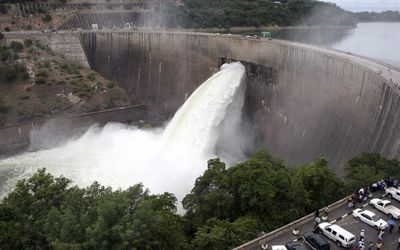
I took a trip to Kariba back in December 2017 and was amazed by the beauty of our environment along the way to Kariba from Harare and the beauty of Kariba itself.
By Thandekile Moyo
The winding route to Kariba affords you a chance to see the resort town from different angles giving one breathtaking views first from above when the road takes you uphill, then you get a side view as the road takes you past the lake and all the way you are surrounded by mountains of rock so unbelievably close the claustrophobic is not for the faint-hearted.
The lake stretches more than the eye can see and the serenity, the blueness of the water and the greenery around it, present a picture more beautiful than the mind can ever imagine.
Lake Kariba came to be upon the construction of Kariba dam, which was built on the Zambezi river. The dam wall diverted the flow of the river into the valley, which then filled up and formed a lake way bigger than anyone could have ever imagined.
Between 1958 and 1963, the water filled up and buried mountains, Tonga villages and everything in its way. Imagine then, how deep it must be if whole mountains are buried in there.
By volume (180 cubic km), it is the largest man-made lake in the world, with a maximum width of 40km and a maximum length of 223km; an average depth of 29m and a maximum depth of 96m.
The area that the lake filled was burned before the water was released making the lake bed one of the most fertile. Because of this, there are all types of fish in the lake providing a thriving fishing industry.
- Chamisa under fire over US$120K donation
- Mavhunga puts DeMbare into Chibuku quarterfinals
- Pension funds bet on Cabora Bassa oilfields
- Councils defy govt fire tender directive
Keep Reading
Kariba town was built to accommodate the people working on the dam construction. The areas of Mlibizi and some parts of Binga are settlements that were formed to settle people who were displaced from where the lake now lies.
This is clear evidence that man can nurture, improve and change the natural environment in as much as we can harm it. The environment is a gift given to us by God to utilise as we please and we, therefore, have the major responsibility of protecting, preserving and improving it for future generations.
But, beautiful as the resort town may be, the surrounding environment leaves a lot to be desired. I was heartbroken to see tiny dilapidated huts on the sides of the road to the town showing the glaring poverty the people around this natural beauty are living in.
In terms of nature, the areas around the Zambezi valley are the richest. That is where we find the big five and almost all the other animal species of Zimbabwe.
It is such places that bring in the much-needed foreign currency to the country. The tourism industry in our country is booming and the “players” are some of the richest in the country.
How then does their conscience, the government’s conscience and ours, allow us to let the local people live in such poverty? A lot of money goes into the conservation of areas such as lake Kariba and the surrounding areas but nobody seems to care about the people in the some areas.
For Lake Kariba to be what it is today, a section of our population had to give up their homes, their natural and man-made heritage, their beliefs, livelihoods and their ancestors’ graves to make way for the lake project.
Imagine being told that your entire village has to relocate because a national project has to happen there. Imagine that happening to you and then you benefit nothing from the project that turned your life up-side- down. Imagine whole communities having to start afresh somewhere new, having to build new homes, clear new farmland and adopt new forms of production in foreign lands. Imagine this happening and you benefiting nothing.
Zimbabwe owes these people. We need to have laws that force businesses to develop the communities they operate from. It is unethical for tourist operators to make money off the land, exploit locals for cheap labour and give nothing back.
We saw pictures of some of the schools in Binga. Learners sit on rocks and have no roof over their heads. Those of us from Matabeleland know Binga as a cheap source of domestic labour. All this is a sign that there is a serious disconnect between the beautiful environment these people come from, the booming tourism happening in their areas and their realities.
This is unacceptable! As a nation which should reject such glaring inequalities, how do we build a hydrothermal power station in Kariba and then go on to electrify other areas? How do we expect international tourists to come and see the beauty of our lake, sleep in safari camps, cruise in boats when locals are disadvantaged?
Locals are terrorised by wild animals, but are expected by the law to protect these animals. Nobody protects them. We took away their livelihood for they were hunters and now when they hunt they are called poachers, but they benefit nothing from the trophy hunters.
When we preach conservation, let us include the conservation of the humanity of the people native to our “tourist” environments. environmental management should include making sure that part of the expenses of operating environmental businesses is the development of communities that these businesses operate from. This should not be negotiable, this should be the law!
Not treating these people with dignity and fairness takes all the beauty out of our beautiful areas. For seriously, how can one see beauty, if to reach it, you have to blind yourself to the poverty around it?










